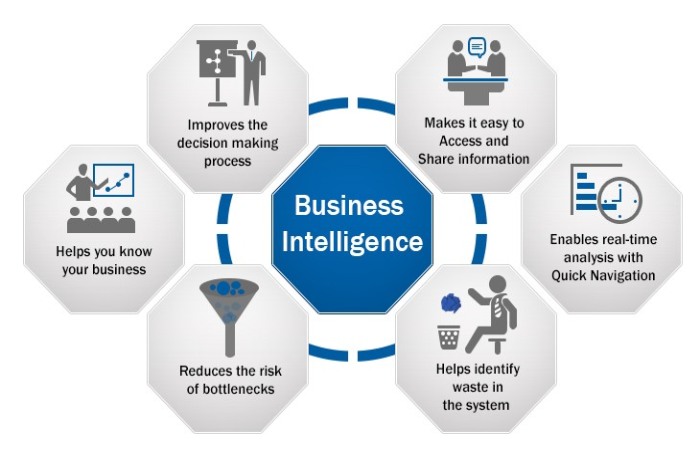Table of Contents
Introduction
Business intelligence is how companies use strategies and technologies to analyze current and historical data, improve strategic decision-making and provide a competitive advantage.
What is Business Intelligence?

BI (Business Intelligence) is a set of developments, styles, and technologies that convert raw data into meaningful data that drives gainful business actions. It is a suite of software and services for turning data into intelligence and actionable insights.
BI directly impacts the organization’s strategic, tactical, and operational business decisions. BI supports fact-based decision-making using historical data instead of guesswork and gut feeling.
How does Business Intelligence work?
Businesses collect and analyze the data needed to find answers to questions and track the progress of their business goals. It gives them the necessary information to determine the action points required to achieve their business goals. Data is collected, processed, and then stored in warehouses, Technically, raw. Once reserved, analysts can access the data and initiate the analysis process to answer business questions. Once the reports are complete, archetypal BI tools like dashboards kick in. And they are automatically collecting that data and plotting it in charts and tables to provide insight into the immediate state of the business. Predicting Amazon’s purchase recommendations during checkout on the e-commerce site is an excellent example of using BI tools.
In another case, if a company wants to improve its supply chain management, it needs BI technologies to pinpoint specific issues within its supply chain process. And such as determining the source of delays and identifying inconsistencies in the procurement process.
Business BI capabilities can also indicate which modes of transportation are involve in the processing delay or the supply of the products that are most often affected or delayed as a result.
How does BI Make a Difference?
Business Intelligence acts as the backbone of today’s modern businesses. Small companies like Tableau or QlikView are making commendable strides in making data analysis visually appealing and easy to understand. These graphical and visualization capabilities make BI tools essential to any business. And companies that implement BI tools grow faster than those that don’t.
Trends in Business Intelligence
Here are some BI and analytics trends you should know.
Artificial intelligence: Gartner’s story indicates that AI and machine learning now support complex tasks performed by human intelligence. This capability is leverage to provide real-time data analysis and dashboard reporting.
Collaborative BI: BI software combined with association tools, social media, and other advanced technologies enhance teamwork and sharing for collaborative decision-making.
Embedded BI: Embedded BI enables the integration of BI software or some of its functionality into another business application to enhance and extend its reporting capabilities.
Cloud Analytics: BI applications will soon be offer in the cloud. We will turn to this technology more and more companies. According to their predictions, spending on cloud-based analytics will grow 4.5 times faster within a few years.
Conclusion
Business Intelligence is a set of processes, styles, and technologies that transform raw data into meaningful insights that drive profitable business actions.BI systems help companies identify market trends and spot business issues that must be addressed.BI technology can use by data analysts, IT professionals, business users, and business leaders.

